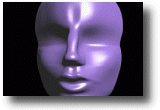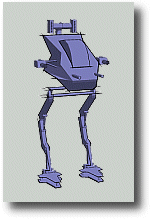What's new in Amapi 3D v5?
There are many new modeling features and other enhancements
in v5. Details are found on the website at www.tgs.com/amapi and right
here but for now, we'll mention just these few:
-
improved bevels with the new Chamfer tool.
You can now create filets on corners and easily select or deselect
individual edges, even for variable-radius fileting. In many instances,
Amapi recognizes "typical" places where bevels may be expected,
perhaps right after doing a boolean 'Punch', and proposes a default
solution:
 Click the image for a short animated illustration
Click the image for a short animated illustration
Bevels can also be used simply to introduce additional polygons, perhaps
in order to create wrinkles in the elbow pit area of a shirt for a more
natural look, like in this example below. After applying the chamfert tool
and creating additional geometry with it, the Smoothing tool is used to
give it a richer, organic look. A nice set of wrinkles appears where the
beveled geometry has been repositioned up or down for a zig-zag profile
to appear.
Click the image for a short animated illustration 
-
dynamic reconstruction with history of construction curves - Cool!
Amapi remembers what basic shapes your models were built with. When
you edit such shapes the model gets rebuilt automatically and in realtime.
For instance, edit and move a vertex on a curve which is part of a Gordon
surface or sweep, and the resulting surface is dynamically recreated.

|
Take for instance a vase, made of a section (circle) and profile curve,
and the Extrusion tool to lathe the section along the profile. When you
use the Stretch tool thereafter in order to edit the vertices of the resulting
mesh, you get to see a choice of various levels at which you can grab vertices
to change the geometry. The bottom icon is the default editing level, in
this case it offers to edit the controls points of the Nurbs curve(s). |
If construction curves were involved in making the suurface, you'll generally
see an option for editing the vertices of the curve(s), then an option
for editing the vertices of the mesh (coarse surface). If additional smoothing
was already applied to the coarse mesh, one more level choice is offered
for editing the vertices of the smoothed, high-polygon count mesh.
Here's another example. The underlying coarse mesh is no longer associated
with construction curves, but some amount of smoothing has been applied
to the coarse mesh of a shirt. By editing a few vertices of the coarse mesh,
a new shape is quickly applied. Amapi does the smoothing on-the-fly as
you move a vertex on the coarse mesh.
coarse mesh of a shirt. By editing a few vertices of the coarse mesh,
a new shape is quickly applied. Amapi does the smoothing on-the-fly as
you move a vertex on the coarse mesh.
Doing some character modeling? How about fixing this model's nose? No
problem with Amapi 5.
-
Better Booleans
In complex cases you will get better results of booleans, and fewer
resulting odd polygons
Here is an example in which 5 cubes are lined up to shape a bone, and
then combined into a single outer hull by successive boolean operations
with the punch tool. Finally, the Catmull smoothing method from the smooth
tool is applied, giving it a nice organic look.
-
5 Smoothing Methods

In addition to the Bezier method, four new smoothing algorithms have
been added, such as Doo-Sabin, C-loop and Katmul. These greatly enhance
the ways in which you can create organic looking smooth transitions between
coarse models.
-
Global Deformators
The Meta-Nurbs tool (first at top of modeling toolkit) has 3 new tools,
for global deformation.

Easily bend, twist and squeeze your models.
 Click the image for a short animated illustration
Click the image for a short animated illustration
-
Improved 3D text tool
Better preview options for interactive selection of the resulting 3D
text. If you still use Amapi v2.11 or Amapi Studio 3 you'll appreciate
this as a new tool alltogether. You can still of course use the text tool
to let Amapi create the resulting extruded text string altogether, as a
Nurbs or polygonal set of character blocks. Or you can use the paths of
the TrueType fonts as duplication paths, sweep paths, sections for extrusions,
etc... If you're a webmaster looking for easy ways to add 3D text,
this is going to be fun!

-
Shape Extraction
Ever received a 3D model of multiple parts which were all in a single
entity? Now you can easily identify and extract various polygons from such
model and assign them to a new part. For example, identify the facets belonging
to and eye, an ear, the nose etc... from a 3D scanner's output.
-
Improved Raytracing and Cartoon Rendering
|
We've added controls of shadow softness on spotlights as well as
2, 4 or more levels of shades in cartoon rendering.
|
 |

|
Click the Mech
to see other cartoon renderings done in Amapi 5 from models created last
year by 12 year-old Amapikid Barrett Phillips.

You'll notice that these cartoon
styles result in fairly compressed images, with good run-length encoding
for animated GIFs, and can also be used for quality 3D content within Flash.
Click the spinning head to read more details about
how
to use Amapi for Flash content. |
Here are some more animations and rendering with Amapi's cartoon style
options:

-
new exports and a 3DS MAX plugin
Since Amapi Studio 3 was released 3 years ago, we've added such exports
as RayDream Studio5, ZAP, NeMo, Cinema 4D and a plugin to 3D Studio
Max 2.5 and 3. Check www.tgs.com/amapi (Import/Exports) for a complete
list of file formats.
If you download the Trial Edition to evaluate Amapi 5.15, be aware that
the 3DS Max plugin installer is not included in the basic download, but
you can get
it from that Import/Export page.
-
great documentation and models & materials collection
MacWorld magazine calls it 'excellent documentation' in its recent
review (9/2000). Check other reviews of Amapi right on our website. And
as always, we've included many royalty-free models and materials you can
immediately use to complement your own illustrations created with Amapi.
There are many other new features, be sure to read about them in
www.tgs.com/amapi
(look for What's New?)

Get the Trial Edition of Amapi from a nearby mirror
at Tucows
Tired of seeing your ISP disconnecting
you from the web while waiting for a successful download of the Amapi Trial
from our busy web server or FTP site? We've been aware of the growing demand
and download activity here, so to help you evaluate it, we've put Amapi
5.15 for Mac and Windows on hundreds of mirror sites around the
TUCOWS
network.
Visit www.tgs.com/amapi
and click "Mac Demo" or "PC Demo" to register for the trial
password which you'll receive via Email. Then select a download site from
TGS or from TUCOWS at www.tucows.com.
Simply enter 'Amapi' in the Search box,
and off you go. With hundreds of mirrors holding their local copy, you're
sure to get the Trial Edition of Amapi on your system in no time if downloading
it from a nearby server! Oh, and while you're loading, check the review
of Amapi at TUCOWS, the Head-of-the-Herd column (Amapi rated top 5 stars
.....er, make that 5 cows!) and what else is 'Moo'.
New Interactive Training CD from Animhouse.com
Gary Phillips at www.Animhouse.com
has released his second edition of the interactive training CD on Amapi.
This 2-CD set is a great tool to help you learn Amapi quickly.
Visit
Animhouse.com for more about the Amapi training CD 
|







